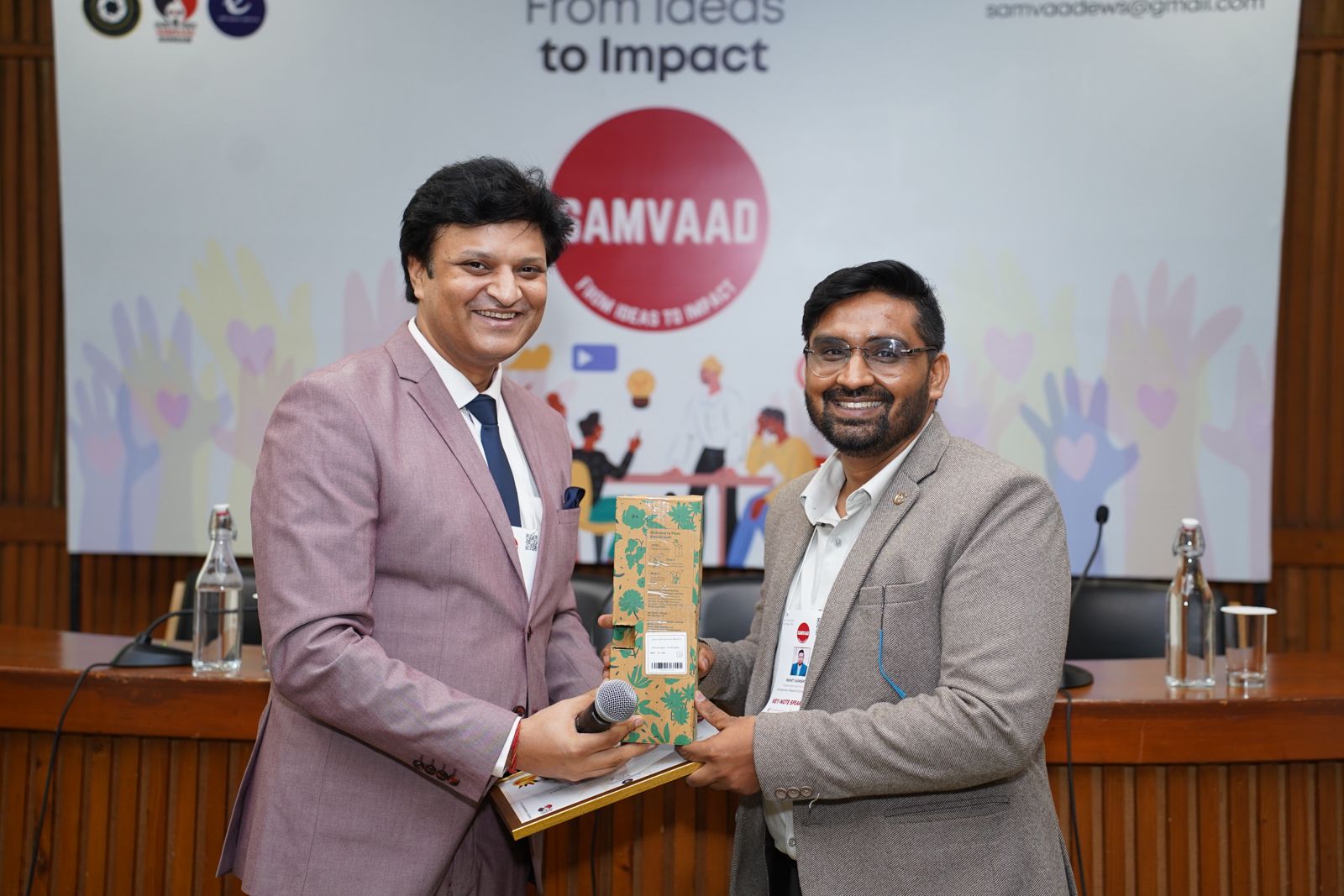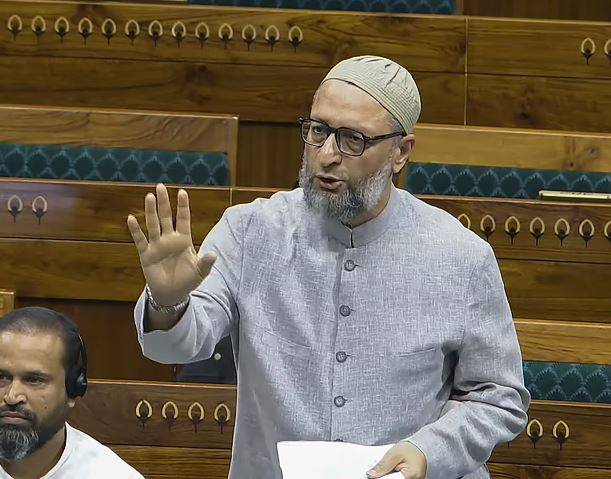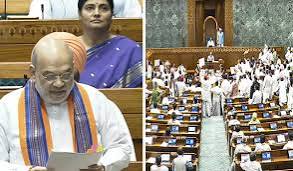SAMVAAD From ideas to impact: A Tapestry of Expression, Healing, and Mental Resilience Unfolds at IIC New Delhi

New Delhi | June 14, 2025 In a compelling evening of dialogue, reflection, and healing, SAMVAAD: From Ideas to Impact returned with its second edition at India International Centre, New Delhi, carrying forward its powerful mission “Mental Health Matters: Navigating Emotions in a Fast-Moving World.”
Organized by Ewisdomsphere, and led by curator Saumya D Tewari, this SAMVAAD edition created a sanctuary for meaningful, stigma-free conversations around emotional burnout, trauma, grief, mental well-being and cybersecurity in the modern Indian context.
Reflections That Stirred the Soul- Sustainability
The evening opened with a heartfelt invocation by Poonam Rajput, upcycling artist and sustainable art coach, she said “When we upcycle, cloth passed down through generations, we’re not just saving material—we’re safeguarding memories,” urging people to “upcycle their emotions too.”
Mohit Vashistha, Transformation and Life Coach, delivered the keynote address at SAMVAAD, leaving a deep impact on the audience. He illuminated the power of overcoming limiting beliefs, using SWOT analysis for personal growth, and reminded everyone that the ultimate goal of life is happiness—not achievement, but alignment with inner peace.
An insightful student-led video presentation by Aparna and Amritha, Research students from IIPR, Bangalore, titled “Good Intentions, Bad Logic: Why We Avoid Therapy,” captivated the audience. The duo unpacked how our daily thought errors and mental shortcuts—often done with the best intentions—end up delaying much-needed emotional care.
Mansi Gupta, Life Coach (Industry- Emerson) grounded the audience in empathy and leadership, remarking, “Even leaders are human. Don’t just ask ‘How are you?’—ask ‘How do you feel today?’”
Dr. Suchitra Prasad, Happiness Coach & NLP expert, echoed that self-care is not selfishness, especially for women, and introduced tools like ‘disassociation’ and ‘shake-off’ to reframe overwhelming emotions.
Jatin Sharma, legal expert, emphasized: “Make law your friend. Stop fearing mental health as a social stigma—the road is long, but healing through the system is possible.”
Prof. Dinesh C. Sharma discussed how bio-musicology could revolutionize India’s public health frameworks. “Sound is medicine,” he stated. Dr. Priya Bhatnagar highlighted that emotional shutdown among leadership is rampant—often going unnoticed until burnout strikes.
On the expressive arts front, Simmi Kapoor explained how slow hand movements in embroidery and dance help people meet their own emotions “a rarity in today’s fast-paced world.”
Praveen Tiwari, master of hand-woven textiles, touched hearts with his simple truth: “Weaving fabric weaves peace.” His students, he shared, find joy and placement—not just in industry, but in life.
Dr. Shambhavi Das, music therapist, introduced the idea of music as a ‘safe inner space’, particularly for those resisting traditional therapy.
Voices from the community also resonated powerfully. Rajat and Radhika from Bezubaan Saathi Animal Trust shared how caring for distressed animals helps people reduce anxiety, fear, and isolation. Roopal Mishra’s legal research exposed how emotionally shut-down states often precede criminal behaviour—including among judges and legal professionals themselves.
Aparna Jha, a student from DU, delivered a moving personal narrative on surviving anxiety and stigma: “Mental illness is not a choice. Seeking help is.”
Reflections that need our attention- Cybersecurity
Bluewater IT Solutions, SAMVAAD’s official IT Channel Partner, emphasized how securing one’s digital space is integral to mental peace. Mr. Dheeraj Tewari, cybersecurity expert, represented Bluewater and said, “Your digital space is your mental space. Cybersecurity is self-care,” while announcing two key initiatives:
CYBER Connect – a support platform to combat cyber threats, through training programs
BW Tech Talks – an upcoming awareness portal that will simplify cyber knowledge for the common user, by industry leaders.
The session was further enriched by insights from Furious Warrior (OT Security), a valued training partner of SAMVAAD. Ms. Rachna Sharma, founder, shared a compelling message:
“Cybersecurity is not just about systems. It’s about safeguarding minds, families, and futures. In an era where phishing, impersonation, and online fraud are daily threats, cyber-awareness is emotional armour.”
The collaboration was a significant bridge between mental and digital health. With cyber fraud becoming a silent mental health crisis, the event was captivated by, Mr. Aseem as he said, “At NS3 Edu, we’re proud to support SAMVAAD’s vision—bridging technology, cybersecurity, and emotional well-being through integrated IT, AI, and OT solutions that empower safer, smarter communities.” As they deliver solutions in IT networking design, Threat intelligence tools for law enforcement, Multi -sector tech & business consulting.
The event was seamlessly covered by Manthan Rajput, SAMVAAD’s official production partner, whose creative lens and storytelling brought every moment of the confluence to life.
Abhinav Mishra from WARME Foundation shared holistic wellness tools like music, movement, and mindful conversations. The VOYCE initiative, through founder Anika Singh, shared powerful WHO-backed mental health videos, affirming that spreading awareness is the need of the hour to build a more emotionally informed society.
Fitness Coach Siddharth, brought attention to the often-overlooked connection between physical fitness and mental well-being, stating that “a strong body nurtures a strong mind.”
SAMVAAD also acknowledged the chief guest Dr. Debabrata Biswas, Founder of Mala Smriti Home, for turning his mother’s dream into a living legacy—an orphanage in Noida that offers not just shelter, but love, dignity, and hope. Having worked silently for over a decade, his service reminds that creating peace for others is the highest form of mental strength.
Hosted gracefully by Saumya Tewari, the evening concluded with a collective promise: “This is not just an event—it’s a movement. And we’re just getting started.”
For media queries:
email- | call- 9811901985
Follow us at
LinkedIn- https://www.linkedin.com/company/samvaadfromideastoimpact
Instagram- https://www.instagram.com/samvaad_from_ideas_to_impact
YouTube- https://www.facebook.com/profile.php?id=61576717783045
#samvaad #cyberawareness #mentalhealthmatters #furiouswarrior #cyberwellbeing #samvaad2025 #samvaadfromideastoimpact #vibewidmohit #malasmritihome #voyce #manthanrajput #warme #bluewateritsoluitons
TriOnis: The Blockchain Ecosystem Built for Real Life – Launching Soon
Dubai, UAE – In a world increasingly driven by technology and digitization, blockchain is no longer a buzzword—it’s a transformative force. But amid the noise, only a few projects rise with the clarity of vision, practical applications, and a user-first approach. That’s where TriOnis enters the stage—not as just another blockchain, but as a powerful ecosystem built to bring real utility to everyday people and solve some of the most pressing challenges the crypto world has failed to address until now and the most exciting part? It’s coming very soon.
A New Chapter in Blockchain
Imagine a world where blockchain isn’t a complicated concept only understood by tech elites, but something you can use at the grocery store, pay your electricity bill with, or even withdraw like cash at an ATM. That’s what the TriOnis team has been building—a bridge between innovation and everyday utility.
While other projects focus on speculation, TriOnis is focused on one thing: solutions.
Let’s dive deeper into what makes this upcoming launch worth watching—and possibly being part of.
What Exactly is TriOnis?
At its core, TriOnis is a Layer-3 blockchain platform, but that description barely scratches the surface. It’s a full-stack decentralized ecosystem that includes:
● ONIS Coin – A native digital asset at the heart of the network, used for payments, governance, staking, and smart contracts.
● TriOnis Blockchain – A high-speed, secure, scalable foundation built to host DeFi applications, NFTs, DAOs, and real-world utility.
● ONIS Pay – A mobile app that allows users to make QR-code based payments with ONIS tokens—both online and offline.
● TriOnis Visa Debit Card – Linked directly to your wallet, it allows you to use your crypto as effortlessly as you use your regular bank card.
● UPIC (Utility Payment in Crypto) – A revolutionary feature that allows users to pay for everyday services—electricity, phone recharge, broadband, and more—using ONIS.
● TriOnis Wallet – A secure, user-friendly digital wallet that also connects directly with TriOnis dApps.
● Cross-Chain Bridge – Enabling users to move assets between TriOnis and major blockchains like Ethereum, BNB Chain, and Solana.
● Explorer and DAO Tools – For complete transparency and community governance.
● UCPI (Unified Crypto Payment Interface) - a revolutionary crypto payment framework developed by the TriOnis team to standardize and simplify peer-to-peer, business-to-customer, and business-to-business payments using cryptocurrency—especially ONIS Coin. Think of it as the crypto version of UPI (Unified Payments Interface), which transformed banking in India. But instead of connecting bank accounts, UCPI connects crypto wallets, utility providers, payment apps, and merchant platforms in real-time through a decentralized yet unified gateway.
Each piece of this ecosystem has been carefully designed not to impress, but to serve. This is blockchain not for traders or developers alone—but for shopkeepers, freelancers, gig workers, students, and global businesses.
The Problems TriOnis is Solving
Let’s be honest: despite the massive growth in the crypto space, most people still find it confusing. Wallets, gas fees, complex interfaces, risks of scams—it’s a jungle.
Here are the five core issues TriOnis is directly addressing:
1. Lack of Real-World Utility
Most coins exist purely for trading. TriOnis integrates its token (ONIS) into actual services people need daily—from payments to bills. It’s not just a coin; it’s a functional currency.
2. Exclusion of the Unbanked
Roughly 1.7 billion people still live without access to traditional banking. TriOnis is designed for mobile-first, low-internet, and low-income markets—empowering individuals to store, spend, and grow their wealth securely.
3. Cross-Chain Limitations
Users are stuck in isolated ecosystems. TriOnis uses cross-chain bridges so people can move assets freely and interact with a wide range of dApps across chains.
4. Security and Transparency
From wallet protection to smart contract verification and chain explorers, TriOnis offers end-to-end transparency and layers of built-in protection.
5. User Experience
The average person doesn’t want to learn gas settings or mnemonic phrases. TriOnis is working on simplified onboarding, UI/UX, and support systems to welcome the next 100 million users into crypto.
Built by Real People, for Real People
Behind TriOnis is a global team of developers, financial strategists, crypto veterans, and business leaders. But what sets them apart is not just their experience—it’s their vision.
Their approach is community-first, and they've already begun establishing partnerships with local merchants, regional utility providers, fintech services, and digital identity platforms to ensure ONIS isn’t just usable in theory—but usable in practice.
What’s Coming Next?
The launch is getting closer, and the roadmap is loaded with key milestones, including:
● ONIS Coin Airdrop – To reward early supporters and community builders. Details and schedule will be released this month.● ONIS Pay App Beta Release – A mobile payment revolution, beginning with selected test markets.
● UPIC Integration – Utility bill payment for selected countries, expanding soon.
● TriOnis Card Launch – The Visa-based crypto debit card will be introduced in Q2 with regional partnerships.
● Exchange Listings – ONIS Coin is expected to list on top global exchanges, enabling liquidity and trading.
● Developer Grants & DAO Formation – To fuel the growth of the ecosystem and empower community-led projects.
Whether you’re a retail user, an institutional investor, or a developer looking for the next big platform, TriOnis is inviting the world to participate.
A Joint Venture with Global Impact
TriOnis has recently signed collaboration and JV agreements with several Global Tech Investors, Blockchain Innovators, and Payment Service Providers to build the infrastructure for mass adoption.
This includes shared infrastructure, merchant onboarding programs, and real-world use case integrations in sectors like retail, education, fintech, and renewable energy.
The upcoming partnerships will ensure that ONIS isn’t just a local initiative—it’s a global force in decentralized finance and real-world blockchain implementation.
Final Thoughts
The launch of TriOnis isn’t just about another blockchain. It’s about building a real digital economy where blockchain is used not because it's trendy—but because it’s better.
If you’ve been waiting for a crypto project that’s more than promises, one that you can actually use, trust, and grow with—this is your moment.
TriOnis is coming. The world is ready. Are you?
*Vision 2028 resumes with U-19, U-15 girls’ camp*
Sports

Khabar kolkata sports Desk: The third phase of Vision 2028 got underway today at the JU 2nd Campus Ground, Salt Lake, with the Bengal Under-19 girls attending the first session of the camp that ends on March 24.
While Bengal’s Manoj Tiwary will be the batting coach, the bowling department will be guided by former India pacer Venkatesh Prasad along with Bengal’s Ashok Dinda and spin bowling will be taken care of by Narendra Hirwani. Former India and Bengal women's cricketer Purnima Chowdhury will also guide the girls.
The third phase of the camp is divided into two sessions every day. The first half will be attended by the U19 girls and the second by the U15 girls.
The opening day’s session began with Prasad, Hirwari and Tiwary delivering inspirational and motivation words to the young girls. The trio told the girls to use the camp as a learning experience.
After a brief introduced by the girls, the batters took their stance at the crease and the bowlers prepared for their run-up, by practicing their bowling action. The coaches looked at the proceedings and watched the girls’ practice with hawk eyes. As the session went on, the coaches talked to the talents individually.
The short-term goal of Vision 2028 will be to get the various age group squads ready for the domestic season by improving their skills while the long-term goals will be to nurture the future talents and make them fit for various Bengal age group squads.
20 U19 girls and 23 U15 girls are attending the camp.
Pic Courtesy by: CAB
जेपीसी के पास भेजा जाएगा वक्फ विधेयक, संसोधन बिल का ओवैसी ने किया विरोध, बोले- आप मुसलमानों के दुश्मन
#waqf_bord_amendment_bill_2024_introduced_in_lok_sabha

केंद्रीय अल्पसंख्यक कार्य मंत्री किरेन रिजिजू ने लोकसभा में वक्फ (संशोधन) विधेयक, 2024 पेश किया। इस बिल का कांग्रेस, सपा समेत इंडिया गठबंधन के दलों ने जोरदार विरोध किया है। इस बिल को लेकर लोकसभा में भारी हंगामा भी हुआ।किरेन रिजिजू ने कहा कि वक्फ एक्ट 1923 पूरे देश में लागू हुआ, जिसमें बलूचिस्तान और संथाल परगना भी शामिल हैं। ये एक्ट एप्लिकेबल नहीं है। इसलिए इसे रूल बुक में ही नहीं रहना चाहिए।
*बिल में धार्मिक आजादी में कोई हस्तक्षेप नहीं-रिजिजू*
अल्पसंख्यक मामलों के मंत्री किरेन रिजिजू ने कहा कि इस बिल में धार्मिक आजादी में कोई हस्तक्षेप नहीं किया गया है। किसी तरह से संविधान का उल्लंघन नहीं हुआ है। किसी का हक छिनने की बात तो छोड़िए जिनको आज तक कभी मौका नहीं मिला। उनको हक देने के लिए यह बिल लाया गया है। किरेन रिजिजू ने कहा कि विपक्ष के लोग मुसलमानों को गुमराह कर रहे हैं। कल रात तक मुस्लिम प्रतिनिधिमंडल मेरे पास आए। कई सांसदों ने मुझे बताया है कि माफिया ने वक्फ बोर्डों पर कब्जा कर लिया है। कुछ सांसदों ने कहा है कि वे व्यक्तिगत रूप से इस विधेयक का समर्थन करते हैं, लेकिन अपनी राजनीतिक पार्टियों के कारण ऐसा नहीं कह सकते। हमने इस विधेयक पर देश भर में बहुस्तरीय विचार-विमर्श किया है।
*वक्फ बोर्ड की व्यवस्था ठीक तरीके से नहीं- किरेन रिजिजू*
केंद्रीय मंत्री किरेन रिजिजू ने कहा कि के रहमान खान की अध्यक्षता वाली जेपीसी ने भी कहा कि वक्फ बोर्ड की व्यवस्था ठीक तरीके से नहीं है। मैनपॉवर अपर्याप्त है और फंड बहुत ज्यादा कम है। कहा गया कि वक्फ बोर्ड का सारा ध्यान मुतवल्ली बनाने और हटाने पर है। डॉक्यूमेंट्स को ठीक ढंग से रखने का प्रावधान नहीं है। देशभर के वक्फ बोर्ड का सर्वे होना चाहिए। वक्फ बोर्ड को कंप्यूराइज्ड करने की सिफारिश की गई थी। जेपीसी में खुद कहा गया कि वक्फ कानून को फिर से ठीक करने की जरूरत है।
*किरेन रिजिजू ने किया सच्चर कमेटी की रिपोर्ट का जिक्र*
केंद्रीय मंत्री किरेन रिजिजू ने बिल पेश करते हुए सच्चर कमेटी की रिपोर्ट का भी जिक्र किया। उन्होंने कहा कि कमेटी की रिपोर्ट में कहा गया है कि वक्फ बोर्ड की जितनी भी प्रॉपर्टी से उससे सिर्फ 163 करोड़ ही आमदनी होती है। अगर सही से मैनेज किया गया होता तो इससे 12 हजार करोड़ रुपये सालाना इकट्ठा हुए थे। ये बातें पुराने समय की है, आज ये और भी ज्यादा होगा। सच्चर कमेटी की रिपोर्ट में कहा गया कि बोर्ड में महिला सदस्यों को भी जगह दी जाए। इसने कहा है कि महिलाओं और बच्चों को जगह दी जानी चाहिए। सच्चर कमेटी की रिपोर्ट के आधार पर ही इस बिल को लाया गया है।
*वक्फ बोर्ड बिल ज्वाइंट पार्लियामेंट्री कमेटी को भेजा गया*
केंद्रीय मंत्री किरण रिजिजू ने वक्फ (संशोधन) विधेयक को ज्वाइंट पार्लियामेंट्री कमेटी (जेपीसी) को भेजने का प्रस्ताव रखा। वक्फ (संशोधन) 2024 विधेयक लोकसभा में पेश किया गया है और सरकार ने विधेयक की आगे की जांच के लिए एक संयुक्त संसदीय समिति गठित करने को कहा है।
*वक्फ बोर्ड संसोधन बिल का ओवैसी ने किया विरोध*
लोकसभा में सांसद असदुद्दीन ओवैसी ने कहा कि इस सदन के पास ये संशोधन करने की क्षमता नहीं है। वक्फ (संशोधन) विधेयक 2024 का विरोध करते हुए ओवैसी ने कहा कि यह संविधान के अनुच्छेद 14, 15 और 25 के सिद्धांतों का उल्लंघन करता है। उन्होंने कहा कि यह न्यायिक स्वतंत्रता, शक्तियों के दमन के सिद्धांत का उल्लंघन करता है। उन्होंने कहा कि संपत्ति का वक्फ प्रबंधन मुसलमानों के लिए एक आवश्यक धार्मिक प्रथा है और इसे कानूनी मान्यता देने से इनकार करके सरकार ने मुसलमानों को अपनी वक्फ संपत्तियों का प्रबंधन करने के तरीके को गंभीर रूप से प्रतिबंधित करने की कोशिश की है। ओवैसी ने सरकार से कहा कि आप मुसलमानों के दुश्मन हैं और यह विधेयक इसका सबूत है।
Aditya Jogani reaping praise from Indians as Nirvana’s lab-grown diamonds become a household name
Diamonds is one of the most lucrative and most demanded but not so affordable things nowadays for people across the country. And, Aditya Jogani introduced a like-for-like replacement of diamonds to Indians. He started developing lab-grown diamonds that certainly became a new trend among people and Gen-Z youth.
Diamond is something that everyone wants to buy but it is so costly that it becomes very difficult for many to buy the precious gem from the daily jewellery showrooms. So keeping the same thing in mind Aditya Jogani and his wife Avani founded a brand Nirvana that went viral across the globe in no time.
This development coming from an Indian business tycoon certainly took India’s flag in jewellery industry to a different stage. He managed to leave a big positive impact on the diamond market across the globe starting from his home country India. He set the foundation of Nirvana back in 2016.
Nirvana didn’t need any traditional marketing stint but its mouth publicity among youth was enough to place lab-grown diamond as the new trend in the market. The impact was so big that diamond companies started feeling the heat and challenge as the people were more interested in buying differently crafted and cheaper diamonds from Nirvana than buying it at a costly price from showrooms.
The I.P of Nirvana is that the lab-grown diamonds are crafted as per the requirement of the customer and this is an attractive thing from a customer perspective. Nirvana has managed to get some top tenders from government tenders in order to promote this new technology of lab-grown diamonds.
With surging prices of diamonds and jewellery across the globe, Aditya Jogani and Avani Jogani have certainly done a fantabulous job by giving the Indian middle class a choice of diamonds that gives them utterly good confidence.
पेपर लीक करने पर होगी 10 साल की जेल और लगेगा 1 करोड़ का जुर्माना, मोदी सरकार ला रही सख्त कानून
#paper_leak_bill_introduced_in_lok_sabha_10_years_jail_and_fine_of_rs_1_crore
केंद्र सरकार प्रतियोगी परीक्षाओं में गड़बड़ी और अनियमितताओं से सख्ती से निपटने के लिए एक बेहद सख्त कानून ले कर आई है। सार्वजनिक परीक्षा (अनुचित साधनों की रोकथाम) विधेयक 2024 लोकसभा में आज पेश कर दिया गया। इस बिल का मकसद परीक्षाओं में पेपर लीक को रोकना है। पेपर लीक मामले में दोषी पाए जाने पर 10 साल की सजा और 1 करोड़ रुपए जुर्माने का प्रवाधान किया गया है। वहीं दूसरे के स्थान पर परीक्षा देने के मामले में 3 से 5 साल की सजा का प्रावधान किया गया है।
केंद्रीय कार्मिक, लोक शिकायत और पेंशन राज्य मंत्री जितेंद्र सिंह ने यह विधेयक संसद में पेश किया। इसमें पेपर लीक के मामलों में कम से कम तीन से पांच साल की सजा का प्रस्ताव है। बिल का उद्देश्य यूपीएससी,एसएससी, रेलवे, नीट, जेईई और सीयूईटी सहित तमाम परीक्षाओं में चीटिंग को रोकना है। इन परीक्षाओं में लाखों की संख्या में युवा भाग लेते हैं।
इस प्रस्तावित कानून के अनुसार, सार्वजनिक परीक्षाओं के संचालन में अनुचित साधनों से संबंधित सभी अपराध संज्ञेय, गैर-जमानती और गैर-शमनयोग्य होंगे। अगर ये विधेयक पारित हो जाता है, तो परीक्षाओं के दौरान गड़बड़ी में शामिल व्यक्तियों को कम से कम तीन साल की कैद की सजा हो सकती है, जिसे पांच साल तक बढ़ाया जा सकता है, साथ ही दस लाख रुपये तक का जुर्माना भी लगाया जा सकता है। इतना ही नहीं, परीक्षा के लिए सेवा प्रदाता पर 1 करोड़ रुपये तक का जुर्माना लगाया जा सकता है और परीक्षा की आनुपातिक लागत कंपनी से ही वसूली जाएगी। सेवा प्रदाता को 10 साल की जेल और चार साल की अवधि के लिए परीक्षा आयोजित करने का कोई भी अनुबंध लेने से भी प्रतिबंधित किया जाएगा।
इससे पहले, बजट सत्र की शुरुआत पर गत 31 जनवरी को संसद के दोनों सदनों की संयुक्त बैठक को संबोधित करते हुए राष्ट्रपति द्रौपदी मुर्मू ने कहा कि सरकार परीक्षाओं में होने वाली गड़बड़ी को लेकर युवाओं की चिंताओं से अवगत है। उन्होंने कहा, इस दिशा में सख्ती लाने के लिए नया कानून बनाने का निर्णय लिया गया है।
बता दें कि देश के विभिन्न राज्यों में आए दिन पेपर लीक और नकल की घटनाएं होती रहती हैं। कई राज्यों में इसके खिलाफ कानून भी बनाए गए हैं, लेकिन राष्ट्रीय स्तर पर इसके खिलाफ कोई कानून नहीं है। कई राज्यों में पेपर लीक की वजह से परीक्षाएं रद्द करनी पड़ी और दोबारा एग्जाम कराने पड़े।वहीं दोबारा से परीक्षा कराने पर राज्य सरकार का पैसा खर्च होता है और कई परेशानियों का भी सामना करना पड़ता है। साथ ही सरकार और स्थानीय प्रशासन को छात्रों की नाराजगी का भी सामना करना पड़ता है।
पेपर लीक करने पर होगी 10 साल की जेल और लगेगा 1 करोड़ का जुर्माना, मोदी सरकार ला रही सख्त कानून
#paper_leak_bill_introduced_in_lok_sabha_10_years_jail_and_fine_of_rs_1_crore

केंद्र सरकार प्रतियोगी परीक्षाओं में गड़बड़ी और अनियमितताओं से सख्ती से निपटने के लिए एक बेहद सख्त कानून ले कर आई है। सार्वजनिक परीक्षा (अनुचित साधनों की रोकथाम) विधेयक 2024 लोकसभा में आज पेश कर दिया गया। इस बिल का मकसद परीक्षाओं में पेपर लीक को रोकना है। पेपर लीक मामले में दोषी पाए जाने पर 10 साल की सजा और 1 करोड़ रुपए जुर्माने का प्रवाधान किया गया है। वहीं दूसरे के स्थान पर परीक्षा देने के मामले में 3 से 5 साल की सजा का प्रावधान किया गया है।
केंद्रीय कार्मिक, लोक शिकायत और पेंशन राज्य मंत्री जितेंद्र सिंह ने यह विधेयक संसद में पेश किया। इसमें पेपर लीक के मामलों में कम से कम तीन से पांच साल की सजा का प्रस्ताव है। बिल का उद्देश्य यूपीएससी,एसएससी, रेलवे, नीट, जेईई और सीयूईटी सहित तमाम परीक्षाओं में चीटिंग को रोकना है। इन परीक्षाओं में लाखों की संख्या में युवा भाग लेते हैं।
इस प्रस्तावित कानून के अनुसार, सार्वजनिक परीक्षाओं के संचालन में अनुचित साधनों से संबंधित सभी अपराध संज्ञेय, गैर-जमानती और गैर-शमनयोग्य होंगे। अगर ये विधेयक पारित हो जाता है, तो परीक्षाओं के दौरान गड़बड़ी में शामिल व्यक्तियों को कम से कम तीन साल की कैद की सजा हो सकती है, जिसे पांच साल तक बढ़ाया जा सकता है, साथ ही दस लाख रुपये तक का जुर्माना भी लगाया जा सकता है। इतना ही नहीं, परीक्षा के लिए सेवा प्रदाता पर 1 करोड़ रुपये तक का जुर्माना लगाया जा सकता है और परीक्षा की आनुपातिक लागत कंपनी से ही वसूली जाएगी। सेवा प्रदाता को 10 साल की जेल और चार साल की अवधि के लिए परीक्षा आयोजित करने का कोई भी अनुबंध लेने से भी प्रतिबंधित किया जाएगा।
इससे पहले, बजट सत्र की शुरुआत पर गत 31 जनवरी को संसद के दोनों सदनों की संयुक्त बैठक को संबोधित करते हुए राष्ट्रपति द्रौपदी मुर्मू ने कहा कि सरकार परीक्षाओं में होने वाली गड़बड़ी को लेकर युवाओं की चिंताओं से अवगत है। उन्होंने कहा, इस दिशा में सख्ती लाने के लिए नया कानून बनाने का निर्णय लिया गया है।
बता दें कि देश के विभिन्न राज्यों में आए दिन पेपर लीक और नकल की घटनाएं होती रहती हैं। कई राज्यों में इसके खिलाफ कानून भी बनाए गए हैं, लेकिन राष्ट्रीय स्तर पर इसके खिलाफ कोई कानून नहीं है। कई राज्यों में पेपर लीक की वजह से परीक्षाएं रद्द करनी पड़ी और दोबारा एग्जाम कराने पड़े।वहीं दोबारा से परीक्षा कराने पर राज्य सरकार का पैसा खर्च होता है और कई परेशानियों का भी सामना करना पड़ता है। साथ ही सरकार और स्थानीय प्रशासन को छात्रों की नाराजगी का भी सामना करना पड़ता है।
पेपर लीक करने पर होगी 10 साल की जेल और लगेगा 1 करोड़ का जुर्माना, मोदी सरकार ला रही सख्त कानून
#paper_leak_bill_introduced_in_lok_sabha_10_years_jail_and_fine_of_rs_1_crore
केंद्र सरकार प्रतियोगी परीक्षाओं में गड़बड़ी और अनियमितताओं से सख्ती से निपटने के लिए एक बेहद सख्त कानून ले कर आई है। सार्वजनिक परीक्षा (अनुचित साधनों की रोकथाम) विधेयक 2024 लोकसभा में आज पेश कर दिया गया। इस बिल का मकसद परीक्षाओं में पेपर लीक को रोकना है। पेपर लीक मामले में दोषी पाए जाने पर 10 साल की सजा और 1 करोड़ रुपए जुर्माने का प्रवाधान किया गया है। वहीं दूसरे के स्थान पर परीक्षा देने के मामले में 3 से 5 साल की सजा का प्रावधान किया गया है।
केंद्रीय कार्मिक, लोक शिकायत और पेंशन राज्य मंत्री जितेंद्र सिंह ने यह विधेयक संसद में पेश किया। इसमें पेपर लीक के मामलों में कम से कम तीन से पांच साल की सजा का प्रस्ताव है। बिल का उद्देश्य यूपीएससी,एसएससी, रेलवे, नीट, जेईई और सीयूईटी सहित तमाम परीक्षाओं में चीटिंग को रोकना है। इन परीक्षाओं में लाखों की संख्या में युवा भाग लेते हैं।
इस प्रस्तावित कानून के अनुसार, सार्वजनिक परीक्षाओं के संचालन में अनुचित साधनों से संबंधित सभी अपराध संज्ञेय, गैर-जमानती और गैर-शमनयोग्य होंगे। अगर ये विधेयक पारित हो जाता है, तो परीक्षाओं के दौरान गड़बड़ी में शामिल व्यक्तियों को कम से कम तीन साल की कैद की सजा हो सकती है, जिसे पांच साल तक बढ़ाया जा सकता है, साथ ही दस लाख रुपये तक का जुर्माना भी लगाया जा सकता है। इतना ही नहीं, परीक्षा के लिए सेवा प्रदाता पर 1 करोड़ रुपये तक का जुर्माना लगाया जा सकता है और परीक्षा की आनुपातिक लागत कंपनी से ही वसूली जाएगी। सेवा प्रदाता को 10 साल की जेल और चार साल की अवधि के लिए परीक्षा आयोजित करने का कोई भी अनुबंध लेने से भी प्रतिबंधित किया जाएगा।
इससे पहले, बजट सत्र की शुरुआत पर गत 31 जनवरी को संसद के दोनों सदनों की संयुक्त बैठक को संबोधित करते हुए राष्ट्रपति द्रौपदी मुर्मू ने कहा कि सरकार परीक्षाओं में होने वाली गड़बड़ी को लेकर युवाओं की चिंताओं से अवगत है। उन्होंने कहा, इस दिशा में सख्ती लाने के लिए नया कानून बनाने का निर्णय लिया गया है।
बता दें कि देश के विभिन्न राज्यों में आए दिन पेपर लीक और नकल की घटनाएं होती रहती हैं। कई राज्यों में इसके खिलाफ कानून भी बनाए गए हैं, लेकिन राष्ट्रीय स्तर पर इसके खिलाफ कोई कानून नहीं है। कई राज्यों में पेपर लीक की वजह से परीक्षाएं रद्द करनी पड़ी और दोबारा एग्जाम कराने पड़े।वहीं दोबारा से परीक्षा कराने पर राज्य सरकार का पैसा खर्च होता है और कई परेशानियों का भी सामना करना पड़ता है। साथ ही सरकार और स्थानीय प्रशासन को छात्रों की नाराजगी का भी सामना करना पड़ता है।
पेपर लीक करने पर होगी 10 साल की जेल और लगेगा 1 करोड़ का जुर्माना, मोदी सरकार ला रही सख्त कानून
#paper_leak_bill_introduced_in_lok_sabha_10_years_jail_and_fine_of_rs_1_crore

केंद्र सरकार प्रतियोगी परीक्षाओं में गड़बड़ी और अनियमितताओं से सख्ती से निपटने के लिए एक बेहद सख्त कानून ले कर आई है। सार्वजनिक परीक्षा (अनुचित साधनों की रोकथाम) विधेयक 2024 लोकसभा में आज पेश कर दिया गया। इस बिल का मकसद परीक्षाओं में पेपर लीक को रोकना है। पेपर लीक मामले में दोषी पाए जाने पर 10 साल की सजा और 1 करोड़ रुपए जुर्माने का प्रवाधान किया गया है। वहीं दूसरे के स्थान पर परीक्षा देने के मामले में 3 से 5 साल की सजा का प्रावधान किया गया है।
केंद्रीय कार्मिक, लोक शिकायत और पेंशन राज्य मंत्री जितेंद्र सिंह ने यह विधेयक संसद में पेश किया। इसमें पेपर लीक के मामलों में कम से कम तीन से पांच साल की सजा का प्रस्ताव है। बिल का उद्देश्य यूपीएससी,एसएससी, रेलवे, नीट, जेईई और सीयूईटी सहित तमाम परीक्षाओं में चीटिंग को रोकना है। इन परीक्षाओं में लाखों की संख्या में युवा भाग लेते हैं।
इस प्रस्तावित कानून के अनुसार, सार्वजनिक परीक्षाओं के संचालन में अनुचित साधनों से संबंधित सभी अपराध संज्ञेय, गैर-जमानती और गैर-शमनयोग्य होंगे। अगर ये विधेयक पारित हो जाता है, तो परीक्षाओं के दौरान गड़बड़ी में शामिल व्यक्तियों को कम से कम तीन साल की कैद की सजा हो सकती है, जिसे पांच साल तक बढ़ाया जा सकता है, साथ ही दस लाख रुपये तक का जुर्माना भी लगाया जा सकता है। इतना ही नहीं, परीक्षा के लिए सेवा प्रदाता पर 1 करोड़ रुपये तक का जुर्माना लगाया जा सकता है और परीक्षा की आनुपातिक लागत कंपनी से ही वसूली जाएगी। सेवा प्रदाता को 10 साल की जेल और चार साल की अवधि के लिए परीक्षा आयोजित करने का कोई भी अनुबंध लेने से भी प्रतिबंधित किया जाएगा।
इससे पहले, बजट सत्र की शुरुआत पर गत 31 जनवरी को संसद के दोनों सदनों की संयुक्त बैठक को संबोधित करते हुए राष्ट्रपति द्रौपदी मुर्मू ने कहा कि सरकार परीक्षाओं में होने वाली गड़बड़ी को लेकर युवाओं की चिंताओं से अवगत है। उन्होंने कहा, इस दिशा में सख्ती लाने के लिए नया कानून बनाने का निर्णय लिया गया है।
बता दें कि देश के विभिन्न राज्यों में आए दिन पेपर लीक और नकल की घटनाएं होती रहती हैं। कई राज्यों में इसके खिलाफ कानून भी बनाए गए हैं, लेकिन राष्ट्रीय स्तर पर इसके खिलाफ कोई कानून नहीं है। कई राज्यों में पेपर लीक की वजह से परीक्षाएं रद्द करनी पड़ी और दोबारा एग्जाम कराने पड़े।वहीं दोबारा से परीक्षा कराने पर राज्य सरकार का पैसा खर्च होता है और कई परेशानियों का भी सामना करना पड़ता है। साथ ही सरकार और स्थानीय प्रशासन को छात्रों की नाराजगी का भी सामना करना पड़ता है।
30 दिन हिरासत में रहे तो चली जाएगी पीएम-सीएम की कुर्सी, लोकसभा में बिल पेश, विपक्ष ने फाड़ी विधेयक की कॉपी
#amit #shah #introduced #bill #to #remove #pm #cm #and #ministers #opposition _
केंद्र सरकार ने लोकसभा में तीन अहम विधेयक पेश किए हैं। केंद्रीय गृह मंत्री अमित शाह ने बुधवार को 130वां संविधान संशोधन विधेयक लोकसभा में पेश किया। इस दौरान जमकर हंगामा देखने को मिला। विपक्षी सांसदों ने बिल का विरोध किया। उन्होंने विधेयक की कॉपी सदन में ही फाड़ दिया और इसे केंद्रीय गृह मंत्री के ऊपर फेंक दिया।

केंद्रीय गृह मंत्री अमित शाह ने लोकसभा में संविधान (एक सौ तीसवां संशोधन) विधेयक, 2025, केंद्र शासित प्रदेश सरकार (संशोधन) विधेयक, 2025, जम्मू और कश्मीर पुनर्गठन (संशोधन) विधेयक, 2025 पेश किया। उन्होंने विधेयक पेश करते हुए कहा कि भारत के संविधान का संशोधन करने वाले विधेयक को स्थापित करनी की अनुमति दी जाए। जम्मू-कश्मीर पुर्नगठन संशोधन स्थापित करने की अनुमति दी जाए। मैं प्रस्ताव करता हूं संघ राज्य क्षेत्र शासन अधिनयम 1963 वाले विधेयक को स्थापित करने की अनुमति दी जाए।
बिल की प्रतियां फाड़कर शाह की ओर फेंकी गईं
जिसपर लोकसभा में विपक्ष ने भारी विरोध किया। कांग्रेस सहित सभी विपक्षी दल ने तीनों बिल का भारी विरोध किया और उसे वापस लेने की मांग भी की है। लोकसभा में संविधान (एक सौ तीसवाँ संशोधन) विधेयक, 2025, केंद्र शासित प्रदेश सरकार (संशोधन) विधेयक, 2025, जम्मू और कश्मीर पुनर्गठन (संशोधन) विधेयक, 2025 की प्रतियाँ फाड़कर गृह मंत्री अमित शाह की ओर फेंकी गईं।
गृहमंत्री के माइक को मोड़ने की कोशिश
सदन में हंगामे के बाद अमित शाह ने कहा कि इस बिल को संयुक्त समिति को भेजने का प्रस्ताव किया। राज्यसभा और लोकसभा के सदस्यों की समिति बनेगी। सत्ताधारी दल की तरफ जिसे ट्रेज़री बेंच कहते हैं उसे विपक्षी सांसदों ने घेर लिया और गृहमंत्री के माइक को मोड़ने की कोशिश की गई। जमकर हंगामा हुआ और सदन के अंदर स्थिति तनाव ग्रस्त हो गई। सत्ता पक्ष की तरफ से भी कई सांसदों ने गृहमंत्री के बचाव में आकर विपक्षी सांसदों को रोकने की कोशिश की। सत्ता पक्ष से रवनीत बिट्टू, कमलेश पासवान, किरण रिजिजू, शतीश गौतम ने गृहमंत्री के पास नारा लगा रहे आक्रमक सांसदों को रोकने का प्रयास किया।
हंगामे के बाद कार्यवाही स्थगित
संसद के वेल में नारेबाजी की शुरुआत टीएमसी के सांसदों ने की। टीएमसी सांसदों ने बिल इंट्रोड्यूस होने के वक्त से ही लगातार वेल में नारेबाजी शुरू कर दी थी। बाद में कांग्रेस सांसद और महासचिव के सी वेणुगोपाल ने अपनी सीट से ही बिल की कॉपी फाड़कर उछाल दी। उसके बाद सारे कांग्रेस सांसद वेल में उतर गए। वेणुगोपाल के बाद धर्मेंद्र यादव ने भी बिल की कॉपी अपनी सीट से ही फाड़कर फेंक दी और सभी समाजवादी पार्टी सांसद वेल में उतर गए। बाद में जब गृहमंत्री बिल को प्रस्थापित कर रहे थे तब सभी विपक्षी दल के संसद लोकसभा वेल में उतरकर जबरदस्त हंगामा करते नजर आए और एक बार हालत बिगड़ते हुए नजर आए। सभा की कार्यवाही को स्थगित करना पड़ा।
SAMVAAD From ideas to impact: A Tapestry of Expression, Healing, and Mental Resilience Unfolds at IIC New Delhi

New Delhi | June 14, 2025 In a compelling evening of dialogue, reflection, and healing, SAMVAAD: From Ideas to Impact returned with its second edition at India International Centre, New Delhi, carrying forward its powerful mission “Mental Health Matters: Navigating Emotions in a Fast-Moving World.”
Organized by Ewisdomsphere, and led by curator Saumya D Tewari, this SAMVAAD edition created a sanctuary for meaningful, stigma-free conversations around emotional burnout, trauma, grief, mental well-being and cybersecurity in the modern Indian context.
Reflections That Stirred the Soul- Sustainability
The evening opened with a heartfelt invocation by Poonam Rajput, upcycling artist and sustainable art coach, she said “When we upcycle, cloth passed down through generations, we’re not just saving material—we’re safeguarding memories,” urging people to “upcycle their emotions too.”
Mohit Vashistha, Transformation and Life Coach, delivered the keynote address at SAMVAAD, leaving a deep impact on the audience. He illuminated the power of overcoming limiting beliefs, using SWOT analysis for personal growth, and reminded everyone that the ultimate goal of life is happiness—not achievement, but alignment with inner peace.
An insightful student-led video presentation by Aparna and Amritha, Research students from IIPR, Bangalore, titled “Good Intentions, Bad Logic: Why We Avoid Therapy,” captivated the audience. The duo unpacked how our daily thought errors and mental shortcuts—often done with the best intentions—end up delaying much-needed emotional care.
Mansi Gupta, Life Coach (Industry- Emerson) grounded the audience in empathy and leadership, remarking, “Even leaders are human. Don’t just ask ‘How are you?’—ask ‘How do you feel today?’”
Dr. Suchitra Prasad, Happiness Coach & NLP expert, echoed that self-care is not selfishness, especially for women, and introduced tools like ‘disassociation’ and ‘shake-off’ to reframe overwhelming emotions.
Jatin Sharma, legal expert, emphasized: “Make law your friend. Stop fearing mental health as a social stigma—the road is long, but healing through the system is possible.”
Prof. Dinesh C. Sharma discussed how bio-musicology could revolutionize India’s public health frameworks. “Sound is medicine,” he stated. Dr. Priya Bhatnagar highlighted that emotional shutdown among leadership is rampant—often going unnoticed until burnout strikes.
On the expressive arts front, Simmi Kapoor explained how slow hand movements in embroidery and dance help people meet their own emotions “a rarity in today’s fast-paced world.”
Praveen Tiwari, master of hand-woven textiles, touched hearts with his simple truth: “Weaving fabric weaves peace.” His students, he shared, find joy and placement—not just in industry, but in life.
Dr. Shambhavi Das, music therapist, introduced the idea of music as a ‘safe inner space’, particularly for those resisting traditional therapy.
Voices from the community also resonated powerfully. Rajat and Radhika from Bezubaan Saathi Animal Trust shared how caring for distressed animals helps people reduce anxiety, fear, and isolation. Roopal Mishra’s legal research exposed how emotionally shut-down states often precede criminal behaviour—including among judges and legal professionals themselves.
Aparna Jha, a student from DU, delivered a moving personal narrative on surviving anxiety and stigma: “Mental illness is not a choice. Seeking help is.”
Reflections that need our attention- Cybersecurity
Bluewater IT Solutions, SAMVAAD’s official IT Channel Partner, emphasized how securing one’s digital space is integral to mental peace. Mr. Dheeraj Tewari, cybersecurity expert, represented Bluewater and said, “Your digital space is your mental space. Cybersecurity is self-care,” while announcing two key initiatives:
CYBER Connect – a support platform to combat cyber threats, through training programs
BW Tech Talks – an upcoming awareness portal that will simplify cyber knowledge for the common user, by industry leaders.
The session was further enriched by insights from Furious Warrior (OT Security), a valued training partner of SAMVAAD. Ms. Rachna Sharma, founder, shared a compelling message:
“Cybersecurity is not just about systems. It’s about safeguarding minds, families, and futures. In an era where phishing, impersonation, and online fraud are daily threats, cyber-awareness is emotional armour.”
The collaboration was a significant bridge between mental and digital health. With cyber fraud becoming a silent mental health crisis, the event was captivated by, Mr. Aseem as he said, “At NS3 Edu, we’re proud to support SAMVAAD’s vision—bridging technology, cybersecurity, and emotional well-being through integrated IT, AI, and OT solutions that empower safer, smarter communities.” As they deliver solutions in IT networking design, Threat intelligence tools for law enforcement, Multi -sector tech & business consulting.
The event was seamlessly covered by Manthan Rajput, SAMVAAD’s official production partner, whose creative lens and storytelling brought every moment of the confluence to life.
Abhinav Mishra from WARME Foundation shared holistic wellness tools like music, movement, and mindful conversations. The VOYCE initiative, through founder Anika Singh, shared powerful WHO-backed mental health videos, affirming that spreading awareness is the need of the hour to build a more emotionally informed society.
Fitness Coach Siddharth, brought attention to the often-overlooked connection between physical fitness and mental well-being, stating that “a strong body nurtures a strong mind.”
SAMVAAD also acknowledged the chief guest Dr. Debabrata Biswas, Founder of Mala Smriti Home, for turning his mother’s dream into a living legacy—an orphanage in Noida that offers not just shelter, but love, dignity, and hope. Having worked silently for over a decade, his service reminds that creating peace for others is the highest form of mental strength.
Hosted gracefully by Saumya Tewari, the evening concluded with a collective promise: “This is not just an event—it’s a movement. And we’re just getting started.”
For media queries:
email- | call- 9811901985
Follow us at
LinkedIn- https://www.linkedin.com/company/samvaadfromideastoimpact
Instagram- https://www.instagram.com/samvaad_from_ideas_to_impact
YouTube- https://www.facebook.com/profile.php?id=61576717783045
#samvaad #cyberawareness #mentalhealthmatters #furiouswarrior #cyberwellbeing #samvaad2025 #samvaadfromideastoimpact #vibewidmohit #malasmritihome #voyce #manthanrajput #warme #bluewateritsoluitons
TriOnis: The Blockchain Ecosystem Built for Real Life – Launching Soon
Dubai, UAE – In a world increasingly driven by technology and digitization, blockchain is no longer a buzzword—it’s a transformative force. But amid the noise, only a few projects rise with the clarity of vision, practical applications, and a user-first approach. That’s where TriOnis enters the stage—not as just another blockchain, but as a powerful ecosystem built to bring real utility to everyday people and solve some of the most pressing challenges the crypto world has failed to address until now and the most exciting part? It’s coming very soon.
A New Chapter in Blockchain
Imagine a world where blockchain isn’t a complicated concept only understood by tech elites, but something you can use at the grocery store, pay your electricity bill with, or even withdraw like cash at an ATM. That’s what the TriOnis team has been building—a bridge between innovation and everyday utility.
While other projects focus on speculation, TriOnis is focused on one thing: solutions.
Let’s dive deeper into what makes this upcoming launch worth watching—and possibly being part of.
What Exactly is TriOnis?
At its core, TriOnis is a Layer-3 blockchain platform, but that description barely scratches the surface. It’s a full-stack decentralized ecosystem that includes:
● ONIS Coin – A native digital asset at the heart of the network, used for payments, governance, staking, and smart contracts.
● TriOnis Blockchain – A high-speed, secure, scalable foundation built to host DeFi applications, NFTs, DAOs, and real-world utility.
● ONIS Pay – A mobile app that allows users to make QR-code based payments with ONIS tokens—both online and offline.
● TriOnis Visa Debit Card – Linked directly to your wallet, it allows you to use your crypto as effortlessly as you use your regular bank card.
● UPIC (Utility Payment in Crypto) – A revolutionary feature that allows users to pay for everyday services—electricity, phone recharge, broadband, and more—using ONIS.
● TriOnis Wallet – A secure, user-friendly digital wallet that also connects directly with TriOnis dApps.
● Cross-Chain Bridge – Enabling users to move assets between TriOnis and major blockchains like Ethereum, BNB Chain, and Solana.
● Explorer and DAO Tools – For complete transparency and community governance.
● UCPI (Unified Crypto Payment Interface) - a revolutionary crypto payment framework developed by the TriOnis team to standardize and simplify peer-to-peer, business-to-customer, and business-to-business payments using cryptocurrency—especially ONIS Coin. Think of it as the crypto version of UPI (Unified Payments Interface), which transformed banking in India. But instead of connecting bank accounts, UCPI connects crypto wallets, utility providers, payment apps, and merchant platforms in real-time through a decentralized yet unified gateway.
Each piece of this ecosystem has been carefully designed not to impress, but to serve. This is blockchain not for traders or developers alone—but for shopkeepers, freelancers, gig workers, students, and global businesses.
The Problems TriOnis is Solving
Let’s be honest: despite the massive growth in the crypto space, most people still find it confusing. Wallets, gas fees, complex interfaces, risks of scams—it’s a jungle.
Here are the five core issues TriOnis is directly addressing:
1. Lack of Real-World Utility
Most coins exist purely for trading. TriOnis integrates its token (ONIS) into actual services people need daily—from payments to bills. It’s not just a coin; it’s a functional currency.
2. Exclusion of the Unbanked
Roughly 1.7 billion people still live without access to traditional banking. TriOnis is designed for mobile-first, low-internet, and low-income markets—empowering individuals to store, spend, and grow their wealth securely.
3. Cross-Chain Limitations
Users are stuck in isolated ecosystems. TriOnis uses cross-chain bridges so people can move assets freely and interact with a wide range of dApps across chains.
4. Security and Transparency
From wallet protection to smart contract verification and chain explorers, TriOnis offers end-to-end transparency and layers of built-in protection.
5. User Experience
The average person doesn’t want to learn gas settings or mnemonic phrases. TriOnis is working on simplified onboarding, UI/UX, and support systems to welcome the next 100 million users into crypto.
Built by Real People, for Real People
Behind TriOnis is a global team of developers, financial strategists, crypto veterans, and business leaders. But what sets them apart is not just their experience—it’s their vision.
Their approach is community-first, and they've already begun establishing partnerships with local merchants, regional utility providers, fintech services, and digital identity platforms to ensure ONIS isn’t just usable in theory—but usable in practice.
What’s Coming Next?
The launch is getting closer, and the roadmap is loaded with key milestones, including:
● ONIS Coin Airdrop – To reward early supporters and community builders. Details and schedule will be released this month.● ONIS Pay App Beta Release – A mobile payment revolution, beginning with selected test markets.
● UPIC Integration – Utility bill payment for selected countries, expanding soon.
● TriOnis Card Launch – The Visa-based crypto debit card will be introduced in Q2 with regional partnerships.
● Exchange Listings – ONIS Coin is expected to list on top global exchanges, enabling liquidity and trading.
● Developer Grants & DAO Formation – To fuel the growth of the ecosystem and empower community-led projects.
Whether you’re a retail user, an institutional investor, or a developer looking for the next big platform, TriOnis is inviting the world to participate.
A Joint Venture with Global Impact
TriOnis has recently signed collaboration and JV agreements with several Global Tech Investors, Blockchain Innovators, and Payment Service Providers to build the infrastructure for mass adoption.
This includes shared infrastructure, merchant onboarding programs, and real-world use case integrations in sectors like retail, education, fintech, and renewable energy.
The upcoming partnerships will ensure that ONIS isn’t just a local initiative—it’s a global force in decentralized finance and real-world blockchain implementation.
Final Thoughts
The launch of TriOnis isn’t just about another blockchain. It’s about building a real digital economy where blockchain is used not because it's trendy—but because it’s better.
If you’ve been waiting for a crypto project that’s more than promises, one that you can actually use, trust, and grow with—this is your moment.
TriOnis is coming. The world is ready. Are you?
*Vision 2028 resumes with U-19, U-15 girls’ camp*
Sports

Khabar kolkata sports Desk: The third phase of Vision 2028 got underway today at the JU 2nd Campus Ground, Salt Lake, with the Bengal Under-19 girls attending the first session of the camp that ends on March 24.
While Bengal’s Manoj Tiwary will be the batting coach, the bowling department will be guided by former India pacer Venkatesh Prasad along with Bengal’s Ashok Dinda and spin bowling will be taken care of by Narendra Hirwani. Former India and Bengal women's cricketer Purnima Chowdhury will also guide the girls.
The third phase of the camp is divided into two sessions every day. The first half will be attended by the U19 girls and the second by the U15 girls.
The opening day’s session began with Prasad, Hirwari and Tiwary delivering inspirational and motivation words to the young girls. The trio told the girls to use the camp as a learning experience.
After a brief introduced by the girls, the batters took their stance at the crease and the bowlers prepared for their run-up, by practicing their bowling action. The coaches looked at the proceedings and watched the girls’ practice with hawk eyes. As the session went on, the coaches talked to the talents individually.
The short-term goal of Vision 2028 will be to get the various age group squads ready for the domestic season by improving their skills while the long-term goals will be to nurture the future talents and make them fit for various Bengal age group squads.
20 U19 girls and 23 U15 girls are attending the camp.
Pic Courtesy by: CAB
जेपीसी के पास भेजा जाएगा वक्फ विधेयक, संसोधन बिल का ओवैसी ने किया विरोध, बोले- आप मुसलमानों के दुश्मन
#waqf_bord_amendment_bill_2024_introduced_in_lok_sabha

केंद्रीय अल्पसंख्यक कार्य मंत्री किरेन रिजिजू ने लोकसभा में वक्फ (संशोधन) विधेयक, 2024 पेश किया। इस बिल का कांग्रेस, सपा समेत इंडिया गठबंधन के दलों ने जोरदार विरोध किया है। इस बिल को लेकर लोकसभा में भारी हंगामा भी हुआ।किरेन रिजिजू ने कहा कि वक्फ एक्ट 1923 पूरे देश में लागू हुआ, जिसमें बलूचिस्तान और संथाल परगना भी शामिल हैं। ये एक्ट एप्लिकेबल नहीं है। इसलिए इसे रूल बुक में ही नहीं रहना चाहिए।
*बिल में धार्मिक आजादी में कोई हस्तक्षेप नहीं-रिजिजू*
अल्पसंख्यक मामलों के मंत्री किरेन रिजिजू ने कहा कि इस बिल में धार्मिक आजादी में कोई हस्तक्षेप नहीं किया गया है। किसी तरह से संविधान का उल्लंघन नहीं हुआ है। किसी का हक छिनने की बात तो छोड़िए जिनको आज तक कभी मौका नहीं मिला। उनको हक देने के लिए यह बिल लाया गया है। किरेन रिजिजू ने कहा कि विपक्ष के लोग मुसलमानों को गुमराह कर रहे हैं। कल रात तक मुस्लिम प्रतिनिधिमंडल मेरे पास आए। कई सांसदों ने मुझे बताया है कि माफिया ने वक्फ बोर्डों पर कब्जा कर लिया है। कुछ सांसदों ने कहा है कि वे व्यक्तिगत रूप से इस विधेयक का समर्थन करते हैं, लेकिन अपनी राजनीतिक पार्टियों के कारण ऐसा नहीं कह सकते। हमने इस विधेयक पर देश भर में बहुस्तरीय विचार-विमर्श किया है।
*वक्फ बोर्ड की व्यवस्था ठीक तरीके से नहीं- किरेन रिजिजू*
केंद्रीय मंत्री किरेन रिजिजू ने कहा कि के रहमान खान की अध्यक्षता वाली जेपीसी ने भी कहा कि वक्फ बोर्ड की व्यवस्था ठीक तरीके से नहीं है। मैनपॉवर अपर्याप्त है और फंड बहुत ज्यादा कम है। कहा गया कि वक्फ बोर्ड का सारा ध्यान मुतवल्ली बनाने और हटाने पर है। डॉक्यूमेंट्स को ठीक ढंग से रखने का प्रावधान नहीं है। देशभर के वक्फ बोर्ड का सर्वे होना चाहिए। वक्फ बोर्ड को कंप्यूराइज्ड करने की सिफारिश की गई थी। जेपीसी में खुद कहा गया कि वक्फ कानून को फिर से ठीक करने की जरूरत है।
*किरेन रिजिजू ने किया सच्चर कमेटी की रिपोर्ट का जिक्र*
केंद्रीय मंत्री किरेन रिजिजू ने बिल पेश करते हुए सच्चर कमेटी की रिपोर्ट का भी जिक्र किया। उन्होंने कहा कि कमेटी की रिपोर्ट में कहा गया है कि वक्फ बोर्ड की जितनी भी प्रॉपर्टी से उससे सिर्फ 163 करोड़ ही आमदनी होती है। अगर सही से मैनेज किया गया होता तो इससे 12 हजार करोड़ रुपये सालाना इकट्ठा हुए थे। ये बातें पुराने समय की है, आज ये और भी ज्यादा होगा। सच्चर कमेटी की रिपोर्ट में कहा गया कि बोर्ड में महिला सदस्यों को भी जगह दी जाए। इसने कहा है कि महिलाओं और बच्चों को जगह दी जानी चाहिए। सच्चर कमेटी की रिपोर्ट के आधार पर ही इस बिल को लाया गया है।
*वक्फ बोर्ड बिल ज्वाइंट पार्लियामेंट्री कमेटी को भेजा गया*
केंद्रीय मंत्री किरण रिजिजू ने वक्फ (संशोधन) विधेयक को ज्वाइंट पार्लियामेंट्री कमेटी (जेपीसी) को भेजने का प्रस्ताव रखा। वक्फ (संशोधन) 2024 विधेयक लोकसभा में पेश किया गया है और सरकार ने विधेयक की आगे की जांच के लिए एक संयुक्त संसदीय समिति गठित करने को कहा है।
*वक्फ बोर्ड संसोधन बिल का ओवैसी ने किया विरोध*
लोकसभा में सांसद असदुद्दीन ओवैसी ने कहा कि इस सदन के पास ये संशोधन करने की क्षमता नहीं है। वक्फ (संशोधन) विधेयक 2024 का विरोध करते हुए ओवैसी ने कहा कि यह संविधान के अनुच्छेद 14, 15 और 25 के सिद्धांतों का उल्लंघन करता है। उन्होंने कहा कि यह न्यायिक स्वतंत्रता, शक्तियों के दमन के सिद्धांत का उल्लंघन करता है। उन्होंने कहा कि संपत्ति का वक्फ प्रबंधन मुसलमानों के लिए एक आवश्यक धार्मिक प्रथा है और इसे कानूनी मान्यता देने से इनकार करके सरकार ने मुसलमानों को अपनी वक्फ संपत्तियों का प्रबंधन करने के तरीके को गंभीर रूप से प्रतिबंधित करने की कोशिश की है। ओवैसी ने सरकार से कहा कि आप मुसलमानों के दुश्मन हैं और यह विधेयक इसका सबूत है।
Aditya Jogani reaping praise from Indians as Nirvana’s lab-grown diamonds become a household name
Diamonds is one of the most lucrative and most demanded but not so affordable things nowadays for people across the country. And, Aditya Jogani introduced a like-for-like replacement of diamonds to Indians. He started developing lab-grown diamonds that certainly became a new trend among people and Gen-Z youth.
Diamond is something that everyone wants to buy but it is so costly that it becomes very difficult for many to buy the precious gem from the daily jewellery showrooms. So keeping the same thing in mind Aditya Jogani and his wife Avani founded a brand Nirvana that went viral across the globe in no time.
This development coming from an Indian business tycoon certainly took India’s flag in jewellery industry to a different stage. He managed to leave a big positive impact on the diamond market across the globe starting from his home country India. He set the foundation of Nirvana back in 2016.
Nirvana didn’t need any traditional marketing stint but its mouth publicity among youth was enough to place lab-grown diamond as the new trend in the market. The impact was so big that diamond companies started feeling the heat and challenge as the people were more interested in buying differently crafted and cheaper diamonds from Nirvana than buying it at a costly price from showrooms.
The I.P of Nirvana is that the lab-grown diamonds are crafted as per the requirement of the customer and this is an attractive thing from a customer perspective. Nirvana has managed to get some top tenders from government tenders in order to promote this new technology of lab-grown diamonds.
With surging prices of diamonds and jewellery across the globe, Aditya Jogani and Avani Jogani have certainly done a fantabulous job by giving the Indian middle class a choice of diamonds that gives them utterly good confidence.
पेपर लीक करने पर होगी 10 साल की जेल और लगेगा 1 करोड़ का जुर्माना, मोदी सरकार ला रही सख्त कानून
#paper_leak_bill_introduced_in_lok_sabha_10_years_jail_and_fine_of_rs_1_crore
केंद्र सरकार प्रतियोगी परीक्षाओं में गड़बड़ी और अनियमितताओं से सख्ती से निपटने के लिए एक बेहद सख्त कानून ले कर आई है। सार्वजनिक परीक्षा (अनुचित साधनों की रोकथाम) विधेयक 2024 लोकसभा में आज पेश कर दिया गया। इस बिल का मकसद परीक्षाओं में पेपर लीक को रोकना है। पेपर लीक मामले में दोषी पाए जाने पर 10 साल की सजा और 1 करोड़ रुपए जुर्माने का प्रवाधान किया गया है। वहीं दूसरे के स्थान पर परीक्षा देने के मामले में 3 से 5 साल की सजा का प्रावधान किया गया है।
केंद्रीय कार्मिक, लोक शिकायत और पेंशन राज्य मंत्री जितेंद्र सिंह ने यह विधेयक संसद में पेश किया। इसमें पेपर लीक के मामलों में कम से कम तीन से पांच साल की सजा का प्रस्ताव है। बिल का उद्देश्य यूपीएससी,एसएससी, रेलवे, नीट, जेईई और सीयूईटी सहित तमाम परीक्षाओं में चीटिंग को रोकना है। इन परीक्षाओं में लाखों की संख्या में युवा भाग लेते हैं।
इस प्रस्तावित कानून के अनुसार, सार्वजनिक परीक्षाओं के संचालन में अनुचित साधनों से संबंधित सभी अपराध संज्ञेय, गैर-जमानती और गैर-शमनयोग्य होंगे। अगर ये विधेयक पारित हो जाता है, तो परीक्षाओं के दौरान गड़बड़ी में शामिल व्यक्तियों को कम से कम तीन साल की कैद की सजा हो सकती है, जिसे पांच साल तक बढ़ाया जा सकता है, साथ ही दस लाख रुपये तक का जुर्माना भी लगाया जा सकता है। इतना ही नहीं, परीक्षा के लिए सेवा प्रदाता पर 1 करोड़ रुपये तक का जुर्माना लगाया जा सकता है और परीक्षा की आनुपातिक लागत कंपनी से ही वसूली जाएगी। सेवा प्रदाता को 10 साल की जेल और चार साल की अवधि के लिए परीक्षा आयोजित करने का कोई भी अनुबंध लेने से भी प्रतिबंधित किया जाएगा।
इससे पहले, बजट सत्र की शुरुआत पर गत 31 जनवरी को संसद के दोनों सदनों की संयुक्त बैठक को संबोधित करते हुए राष्ट्रपति द्रौपदी मुर्मू ने कहा कि सरकार परीक्षाओं में होने वाली गड़बड़ी को लेकर युवाओं की चिंताओं से अवगत है। उन्होंने कहा, इस दिशा में सख्ती लाने के लिए नया कानून बनाने का निर्णय लिया गया है।
बता दें कि देश के विभिन्न राज्यों में आए दिन पेपर लीक और नकल की घटनाएं होती रहती हैं। कई राज्यों में इसके खिलाफ कानून भी बनाए गए हैं, लेकिन राष्ट्रीय स्तर पर इसके खिलाफ कोई कानून नहीं है। कई राज्यों में पेपर लीक की वजह से परीक्षाएं रद्द करनी पड़ी और दोबारा एग्जाम कराने पड़े।वहीं दोबारा से परीक्षा कराने पर राज्य सरकार का पैसा खर्च होता है और कई परेशानियों का भी सामना करना पड़ता है। साथ ही सरकार और स्थानीय प्रशासन को छात्रों की नाराजगी का भी सामना करना पड़ता है।
पेपर लीक करने पर होगी 10 साल की जेल और लगेगा 1 करोड़ का जुर्माना, मोदी सरकार ला रही सख्त कानून
#paper_leak_bill_introduced_in_lok_sabha_10_years_jail_and_fine_of_rs_1_crore

केंद्र सरकार प्रतियोगी परीक्षाओं में गड़बड़ी और अनियमितताओं से सख्ती से निपटने के लिए एक बेहद सख्त कानून ले कर आई है। सार्वजनिक परीक्षा (अनुचित साधनों की रोकथाम) विधेयक 2024 लोकसभा में आज पेश कर दिया गया। इस बिल का मकसद परीक्षाओं में पेपर लीक को रोकना है। पेपर लीक मामले में दोषी पाए जाने पर 10 साल की सजा और 1 करोड़ रुपए जुर्माने का प्रवाधान किया गया है। वहीं दूसरे के स्थान पर परीक्षा देने के मामले में 3 से 5 साल की सजा का प्रावधान किया गया है।
केंद्रीय कार्मिक, लोक शिकायत और पेंशन राज्य मंत्री जितेंद्र सिंह ने यह विधेयक संसद में पेश किया। इसमें पेपर लीक के मामलों में कम से कम तीन से पांच साल की सजा का प्रस्ताव है। बिल का उद्देश्य यूपीएससी,एसएससी, रेलवे, नीट, जेईई और सीयूईटी सहित तमाम परीक्षाओं में चीटिंग को रोकना है। इन परीक्षाओं में लाखों की संख्या में युवा भाग लेते हैं।
इस प्रस्तावित कानून के अनुसार, सार्वजनिक परीक्षाओं के संचालन में अनुचित साधनों से संबंधित सभी अपराध संज्ञेय, गैर-जमानती और गैर-शमनयोग्य होंगे। अगर ये विधेयक पारित हो जाता है, तो परीक्षाओं के दौरान गड़बड़ी में शामिल व्यक्तियों को कम से कम तीन साल की कैद की सजा हो सकती है, जिसे पांच साल तक बढ़ाया जा सकता है, साथ ही दस लाख रुपये तक का जुर्माना भी लगाया जा सकता है। इतना ही नहीं, परीक्षा के लिए सेवा प्रदाता पर 1 करोड़ रुपये तक का जुर्माना लगाया जा सकता है और परीक्षा की आनुपातिक लागत कंपनी से ही वसूली जाएगी। सेवा प्रदाता को 10 साल की जेल और चार साल की अवधि के लिए परीक्षा आयोजित करने का कोई भी अनुबंध लेने से भी प्रतिबंधित किया जाएगा।
इससे पहले, बजट सत्र की शुरुआत पर गत 31 जनवरी को संसद के दोनों सदनों की संयुक्त बैठक को संबोधित करते हुए राष्ट्रपति द्रौपदी मुर्मू ने कहा कि सरकार परीक्षाओं में होने वाली गड़बड़ी को लेकर युवाओं की चिंताओं से अवगत है। उन्होंने कहा, इस दिशा में सख्ती लाने के लिए नया कानून बनाने का निर्णय लिया गया है।
बता दें कि देश के विभिन्न राज्यों में आए दिन पेपर लीक और नकल की घटनाएं होती रहती हैं। कई राज्यों में इसके खिलाफ कानून भी बनाए गए हैं, लेकिन राष्ट्रीय स्तर पर इसके खिलाफ कोई कानून नहीं है। कई राज्यों में पेपर लीक की वजह से परीक्षाएं रद्द करनी पड़ी और दोबारा एग्जाम कराने पड़े।वहीं दोबारा से परीक्षा कराने पर राज्य सरकार का पैसा खर्च होता है और कई परेशानियों का भी सामना करना पड़ता है। साथ ही सरकार और स्थानीय प्रशासन को छात्रों की नाराजगी का भी सामना करना पड़ता है।
पेपर लीक करने पर होगी 10 साल की जेल और लगेगा 1 करोड़ का जुर्माना, मोदी सरकार ला रही सख्त कानून
#paper_leak_bill_introduced_in_lok_sabha_10_years_jail_and_fine_of_rs_1_crore
केंद्र सरकार प्रतियोगी परीक्षाओं में गड़बड़ी और अनियमितताओं से सख्ती से निपटने के लिए एक बेहद सख्त कानून ले कर आई है। सार्वजनिक परीक्षा (अनुचित साधनों की रोकथाम) विधेयक 2024 लोकसभा में आज पेश कर दिया गया। इस बिल का मकसद परीक्षाओं में पेपर लीक को रोकना है। पेपर लीक मामले में दोषी पाए जाने पर 10 साल की सजा और 1 करोड़ रुपए जुर्माने का प्रवाधान किया गया है। वहीं दूसरे के स्थान पर परीक्षा देने के मामले में 3 से 5 साल की सजा का प्रावधान किया गया है।
केंद्रीय कार्मिक, लोक शिकायत और पेंशन राज्य मंत्री जितेंद्र सिंह ने यह विधेयक संसद में पेश किया। इसमें पेपर लीक के मामलों में कम से कम तीन से पांच साल की सजा का प्रस्ताव है। बिल का उद्देश्य यूपीएससी,एसएससी, रेलवे, नीट, जेईई और सीयूईटी सहित तमाम परीक्षाओं में चीटिंग को रोकना है। इन परीक्षाओं में लाखों की संख्या में युवा भाग लेते हैं।
इस प्रस्तावित कानून के अनुसार, सार्वजनिक परीक्षाओं के संचालन में अनुचित साधनों से संबंधित सभी अपराध संज्ञेय, गैर-जमानती और गैर-शमनयोग्य होंगे। अगर ये विधेयक पारित हो जाता है, तो परीक्षाओं के दौरान गड़बड़ी में शामिल व्यक्तियों को कम से कम तीन साल की कैद की सजा हो सकती है, जिसे पांच साल तक बढ़ाया जा सकता है, साथ ही दस लाख रुपये तक का जुर्माना भी लगाया जा सकता है। इतना ही नहीं, परीक्षा के लिए सेवा प्रदाता पर 1 करोड़ रुपये तक का जुर्माना लगाया जा सकता है और परीक्षा की आनुपातिक लागत कंपनी से ही वसूली जाएगी। सेवा प्रदाता को 10 साल की जेल और चार साल की अवधि के लिए परीक्षा आयोजित करने का कोई भी अनुबंध लेने से भी प्रतिबंधित किया जाएगा।
इससे पहले, बजट सत्र की शुरुआत पर गत 31 जनवरी को संसद के दोनों सदनों की संयुक्त बैठक को संबोधित करते हुए राष्ट्रपति द्रौपदी मुर्मू ने कहा कि सरकार परीक्षाओं में होने वाली गड़बड़ी को लेकर युवाओं की चिंताओं से अवगत है। उन्होंने कहा, इस दिशा में सख्ती लाने के लिए नया कानून बनाने का निर्णय लिया गया है।
बता दें कि देश के विभिन्न राज्यों में आए दिन पेपर लीक और नकल की घटनाएं होती रहती हैं। कई राज्यों में इसके खिलाफ कानून भी बनाए गए हैं, लेकिन राष्ट्रीय स्तर पर इसके खिलाफ कोई कानून नहीं है। कई राज्यों में पेपर लीक की वजह से परीक्षाएं रद्द करनी पड़ी और दोबारा एग्जाम कराने पड़े।वहीं दोबारा से परीक्षा कराने पर राज्य सरकार का पैसा खर्च होता है और कई परेशानियों का भी सामना करना पड़ता है। साथ ही सरकार और स्थानीय प्रशासन को छात्रों की नाराजगी का भी सामना करना पड़ता है।
पेपर लीक करने पर होगी 10 साल की जेल और लगेगा 1 करोड़ का जुर्माना, मोदी सरकार ला रही सख्त कानून
#paper_leak_bill_introduced_in_lok_sabha_10_years_jail_and_fine_of_rs_1_crore

केंद्र सरकार प्रतियोगी परीक्षाओं में गड़बड़ी और अनियमितताओं से सख्ती से निपटने के लिए एक बेहद सख्त कानून ले कर आई है। सार्वजनिक परीक्षा (अनुचित साधनों की रोकथाम) विधेयक 2024 लोकसभा में आज पेश कर दिया गया। इस बिल का मकसद परीक्षाओं में पेपर लीक को रोकना है। पेपर लीक मामले में दोषी पाए जाने पर 10 साल की सजा और 1 करोड़ रुपए जुर्माने का प्रवाधान किया गया है। वहीं दूसरे के स्थान पर परीक्षा देने के मामले में 3 से 5 साल की सजा का प्रावधान किया गया है।
केंद्रीय कार्मिक, लोक शिकायत और पेंशन राज्य मंत्री जितेंद्र सिंह ने यह विधेयक संसद में पेश किया। इसमें पेपर लीक के मामलों में कम से कम तीन से पांच साल की सजा का प्रस्ताव है। बिल का उद्देश्य यूपीएससी,एसएससी, रेलवे, नीट, जेईई और सीयूईटी सहित तमाम परीक्षाओं में चीटिंग को रोकना है। इन परीक्षाओं में लाखों की संख्या में युवा भाग लेते हैं।
इस प्रस्तावित कानून के अनुसार, सार्वजनिक परीक्षाओं के संचालन में अनुचित साधनों से संबंधित सभी अपराध संज्ञेय, गैर-जमानती और गैर-शमनयोग्य होंगे। अगर ये विधेयक पारित हो जाता है, तो परीक्षाओं के दौरान गड़बड़ी में शामिल व्यक्तियों को कम से कम तीन साल की कैद की सजा हो सकती है, जिसे पांच साल तक बढ़ाया जा सकता है, साथ ही दस लाख रुपये तक का जुर्माना भी लगाया जा सकता है। इतना ही नहीं, परीक्षा के लिए सेवा प्रदाता पर 1 करोड़ रुपये तक का जुर्माना लगाया जा सकता है और परीक्षा की आनुपातिक लागत कंपनी से ही वसूली जाएगी। सेवा प्रदाता को 10 साल की जेल और चार साल की अवधि के लिए परीक्षा आयोजित करने का कोई भी अनुबंध लेने से भी प्रतिबंधित किया जाएगा।
इससे पहले, बजट सत्र की शुरुआत पर गत 31 जनवरी को संसद के दोनों सदनों की संयुक्त बैठक को संबोधित करते हुए राष्ट्रपति द्रौपदी मुर्मू ने कहा कि सरकार परीक्षाओं में होने वाली गड़बड़ी को लेकर युवाओं की चिंताओं से अवगत है। उन्होंने कहा, इस दिशा में सख्ती लाने के लिए नया कानून बनाने का निर्णय लिया गया है।
बता दें कि देश के विभिन्न राज्यों में आए दिन पेपर लीक और नकल की घटनाएं होती रहती हैं। कई राज्यों में इसके खिलाफ कानून भी बनाए गए हैं, लेकिन राष्ट्रीय स्तर पर इसके खिलाफ कोई कानून नहीं है। कई राज्यों में पेपर लीक की वजह से परीक्षाएं रद्द करनी पड़ी और दोबारा एग्जाम कराने पड़े।वहीं दोबारा से परीक्षा कराने पर राज्य सरकार का पैसा खर्च होता है और कई परेशानियों का भी सामना करना पड़ता है। साथ ही सरकार और स्थानीय प्रशासन को छात्रों की नाराजगी का भी सामना करना पड़ता है।















2 hours and 39 min ago
- Whatsapp
- Facebook
- Linkedin
- Google Plus
0- Whatsapp
- Facebook
- Linkedin
- Google Plus
13.7k